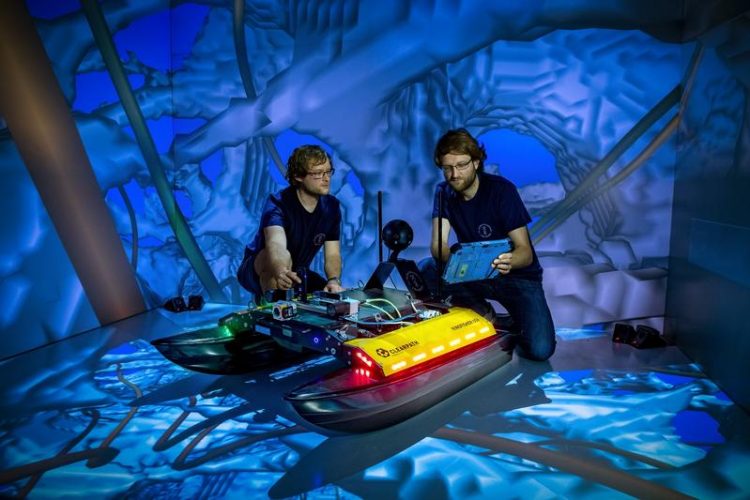Intelligent robot system at the TU Bergakademie Freiberg improves drinking water control in inland waters

Two computer scientists from Freiberg working on the newly developed swimming robot "Elisabeth" in the CAVE. Photo: Detlev Müller/ TU Bergakademie Freiberg
Inland waters are of outstanding importance in Germany and worldwide for drinking water supply, ecology, tourism and agriculture. In Saxony alone there are 23 drinking water reservoirs, 80 other reservoirs and countless other lakes and ponds.
Microplastics, increased levels of organic carbon and the influx of nutrients pollute many water bodies. In addition, the previous control of water quality through selective sampling on site and subsequent analysis in the laboratory is very time-consuming and costly.
A new robotic sensor system from the Technical University Bergakademie Freiberg will enable real-time monitoring in drinking water reservoirs and reservoirs as well as newly flooded open-cast mining lakes. In this way, even short-term ecological and hydrological changes will be immediately visible.
To this end, scientists in the new ESF project “RoBiMo” (Robot-Assisted Inland Water Monitoring) are now developing special sensors that can measure, among other things, temperature, pressure, pH value, phosphate or mercury content, as well as gas and solids content.
A sonar is to scan the waters from the bottom to the surface. The system is to be attached to the autonomous swimming robot “Elisabeth”, also developed at the TU Freiberg. During its journey, it will continuously measure all relevant data and send them to a base station on the shore. From there, the Freiberg scientists can process them with the help of artificial intelligence and display them three-dimensionally in virtual reality.
“The resulting data enables us to draw conclusions about the state of inland waters, groundwater inflows and the CO2 storage function of lakes, for example. With these findings, we can understand water as a resource even better, guarantee its high quality for humans and the environment and develop concepts for a more sustainable use of it,” explains Prof. Yvonne Joseph, coordinator of the RoBiMo project.
The interdisciplinary project, which was officially launched in January, fits into the Centre for Water Research Freiberg, which bundles the manifold activities in the field of research and teaching at the Bergakademie. It is funded by the state of Saxony and the European Social Fund for three years (January 2020 to December 2022).
Four young scientists and a total of seven professorships from various fields of environmental, geo and engineering sciences as well as microelectronics and computer science are involved. The science divers of the Scientific Diving Center of TU Freiberg are also involved.
During dives, they determine so-called “ground truth” data, which are necessary for the analysis of remote sensing data such as measured variables and “real” underwater geography.
Prof. Dr. Yvonne Joseph, Tel.: +49 3731 39 2146, M. Sc. Sebastian Pose, Tel.: +49 3731 39 3252
https://tu-freiberg.de/en/esm/institute/institute-of-electronic-and-sensor-mater…
Media Contact
All latest news from the category: Information Technology
Here you can find a summary of innovations in the fields of information and data processing and up-to-date developments on IT equipment and hardware.
This area covers topics such as IT services, IT architectures, IT management and telecommunications.
Newest articles

Properties of new materials for microchips
… can now be measured well. Reseachers of Delft University of Technology demonstrated measuring performance properties of ultrathin silicon membranes. Making ever smaller and more powerful chips requires new ultrathin…

Floating solar’s potential
… to support sustainable development by addressing climate, water, and energy goals holistically. A new study published this week in Nature Energy raises the potential for floating solar photovoltaics (FPV)…

Skyrmions move at record speeds
… a step towards the computing of the future. An international research team led by scientists from the CNRS1 has discovered that the magnetic nanobubbles2 known as skyrmions can be…





















